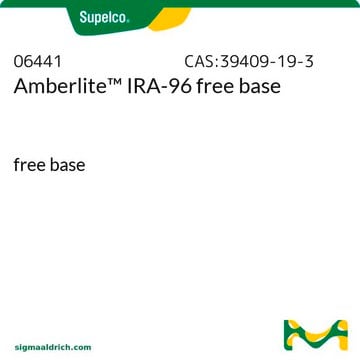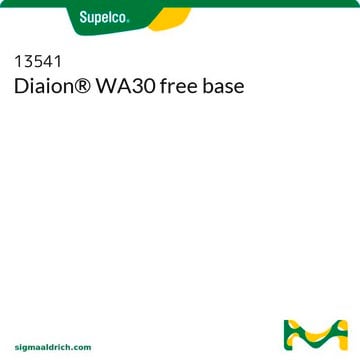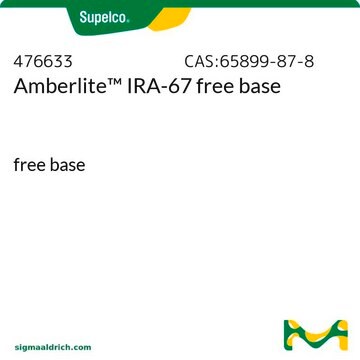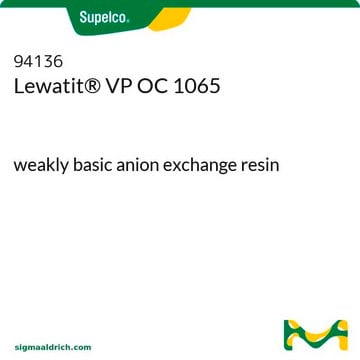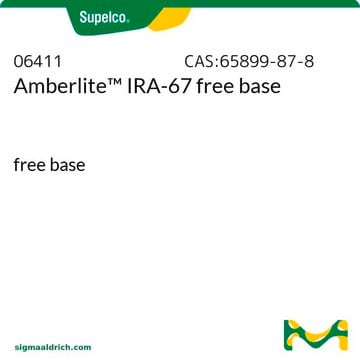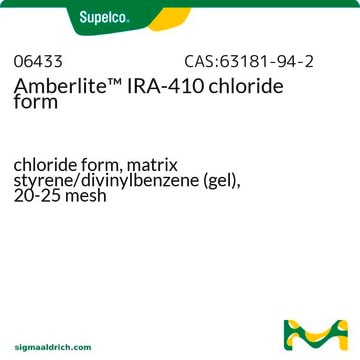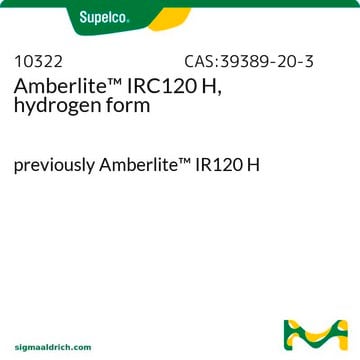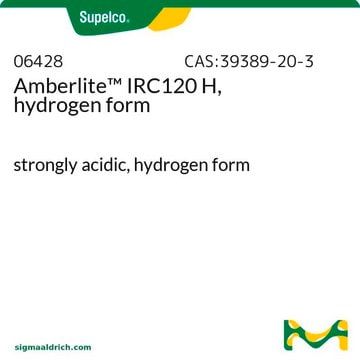Recommended Products
form
beads
packaging
pkg of 1 kg
parameter
100 °C max. temp.
moisture
~49%
technique(s)
LPLC: suitable
matrix
styrene-divinylbenzene (highly porous)
matrix active group
tertiary amine
particle size
16-50 mesh
operating pH
0-9
capacity
1.5 meq/mL by wetted bed volume
3.0 meq/g by dry weight
separation technique
anion exchange
Looking for similar products? Visit Product Comparison Guide
Related Categories
General description
Diaion WA30 is highly porous weak-base anion exchange resin with tertiary amine groups. It is used as an absorbent which is effective in the removal of arsenic(V) from drinking water/ground water. It is used to separate trace amounts of Pd (II), Pt(IV) and Au(III) from macrocomponent ions.
Application
- Diaion WA30 was used for pre-conditioning the columns for HPLC analysis.
- Diaion WA30 was used for immobilization of enzymes.
Weakly basic anion exchange resin that is best in class for high MW organic acids. It also has a strong decolorization capability. Applications for the resin include: water treatment, pretreatment of corn syrup, beet sugar and dextrose, refining of formalin, glycerine, and enzymes, and as a weak base catalyst. This resin meets requirements of FDA Food Additive Regulation 21 CFR 173.25.
Legal Information
Diaion is a registered trademark of Mitsubishi Chemical Corp.
Storage Class Code
11 - Combustible Solids
WGK
WGK 3
Flash Point(F)
Not applicable
Flash Point(C)
Not applicable
Personal Protective Equipment
dust mask type N95 (US), Eyeshields, Gloves
Choose from one of the most recent versions:
Already Own This Product?
Find documentation for the products that you have recently purchased in the Document Library.
Customers Also Viewed
Immobilization of levan fructotransferase for the production of di-fructose anhydride from levan
Lim, Seung, et al.
Biotechnology Letters, 23, 1335-1339 (2001)
M Rabiul Awual et al.
Environmental science and pollution research international, 20(1), 421-430 (2012-05-09)
Arsenic contamination of groundwater has been called the largest mass poisoning calamity in human history and creates severe health problems. The effective adsorbents are imperative in response to the widespread removal of toxic arsenic exposure through drinking water. Evaluation of
Fundamental studies on the ion-exchange separation of boron isotopes
Kakihana, Hidetake, et al.
Bulletin of the Chemical Society of Japan, 50, 158-163 (1977)
Effect of amyloglucosidase on wort composition and fermentable carbohydrate depletion in sorghum lager beers
Pozo-Insfran, David, et al.
Journal of the Institute of Brewing, 110, 124-132 (2004)
Investigation of macroporous weakly basic anion exchangers applicability in palladium (II) removal from acidic solutions-batch and column studies
Wolowicz, A., and Z. Hubicki.
Chemical Engineering Journal, 174, 510-521 (2011)
Our team of scientists has experience in all areas of research including Life Science, Material Science, Chemical Synthesis, Chromatography, Analytical and many others.
Contact Technical Service